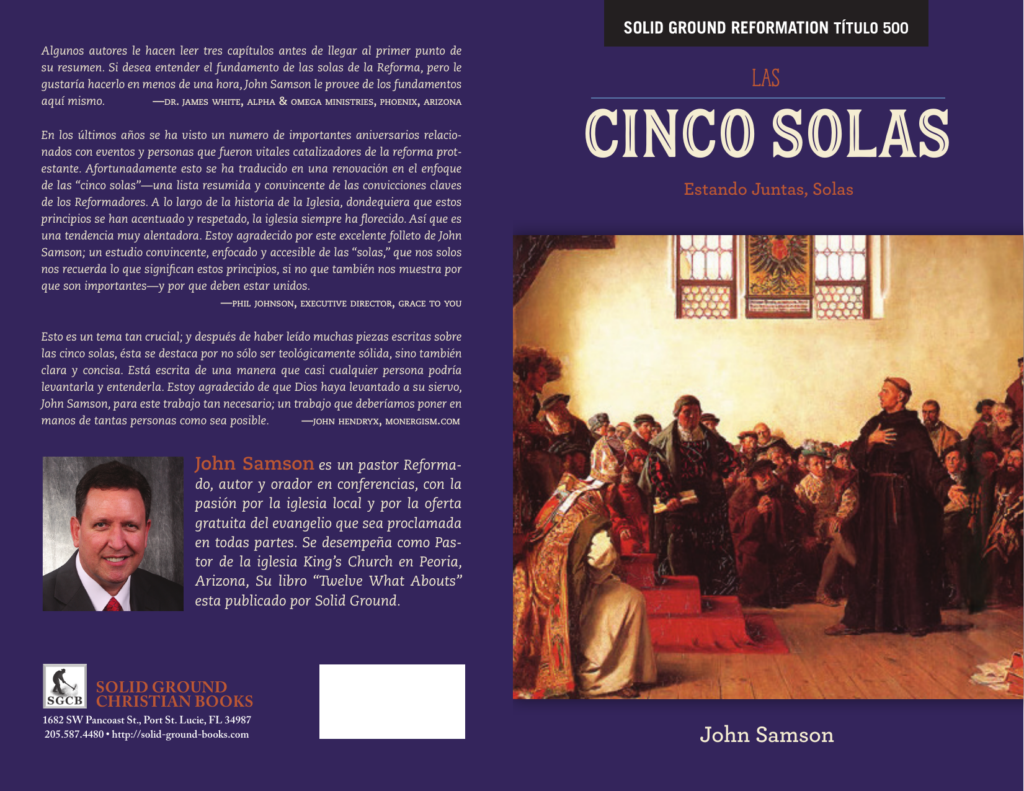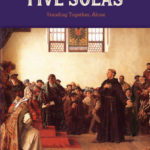Dr. Kim Riddlebarger’s article on the Five Solas – original source:
https://www.kimriddlebarger.com/the-riddleblog/4hrw7xxpbm28ki7w3cqa0y4l4jw8io
The Five Solas of the Protestant Reformation
Many churches which trace their theological ancestry back to the Protestant Reformation, commemorate Reformation Day. October 31, 1517, is the traditional date when Martin Luther, a young biblical scholar and troubled son of the Roman church, nailed his 95 Theses to the door of the Castle Church in the city of Wittenberg. Professor Luther sought to challenge the Roman church’s understanding of the sacrament of penance. The act of posting written theses (objections) was simply the way in which professors of that day called for academic debate.
Luther was as surprised as anyone when his 95 Theses gave voice those to countless German peasants who felt that the Roman church had grown increasing greedy, corrupt, and indifferent to their needs. When the Dominican friar Johann Tetzel came through Germany selling indulgences–which supposedly shortened the time that a sinner spent in purgatory–ordinary Germans were outraged. How dare Rome send an emissary into Germany to sell indulgences at a time of great economic hardship, especially when the proceeds from the sale went to pay for the construction of St. Peter’s Basilica in Rome–a grand church which no German peasant would ever see.
While German peasants hated the Roman church because of the church’s arrogance and indifference, for Luther, the issues were theological. When Luther’s theses were published and quickly disseminated across much of Germany, it soon became clear that this was not just a debate about a fine point of doctrine (penance), but a fundamental challenge to the nature of religious authority as understood by the Roman Catholic Church. This was, in fact, a direct challenge to Rome’s teaching on good works, merit, faith, and the nature of the gospel. It was not long before Protestantism was a wide-spread movement and a burgeoning theological threat to the Roman church–especially in northern Europe. Although Protestantism soon separated into Lutheran and Reformed branches, the Protestant objections to Rome quickly crystalized around the so-called “five Solas” of the Reformation. These five “onlys” include: Scripture alone, grace alone, Christ alone, faith alone, and glory to God alone.
The Roman church believed Scripture was God’s word. But Rome didn’t see Scripture as the primary ground of religious authority–there was also church tradition as an equal authority. The Roman church believed in grace, but defined grace as a substance dispensed through the sacramental system of the church, and that such grace must be energized by the human will in order to be effective in matters of salvation. Rome militantly defended the deity of Christ and his sacrificial death for sins. But Rome taught that the merit of human good works must be added to the merits of Christ in order for sinners to be made right with God (justification). Rome also taught that faith was an essential Christian virtue, but understood that simple faith must be formed into an active faith which then produced those Christian virtues and good works which merited (earned) favor from God. While in theory the Roman church gave all glory to God, in practice, Rome’s theology spread glory around to Mary, the papacy, the church, the saints, and even to human good works.
What has separated Protestantism from Rome since 1517, is not Scripture, grace, faith, Christ, or glory to God. What caused the great divide between Protestants and Catholics was the Protestant insistence upon that little adjective “sola” or “only.” Scripture alone. Grace alone. Christ alone. Faith alone. Glory to God alone.
Sola Scriptura
The so-called formal principle of the Protestant Reformation, sola Scriptura is the affirmation that Scripture alone–not the church’s officers, not religious tradition, nor personal experience–is the sole authority for Christian faith and practice.
Sola Scriptura presupposes the fact that God is transcendent and remains completely hidden from us, unless and until he reveals himself to us. God reveals himself in two ways (Psalm 19). The first way is through the so-called book of nature (the natural order). But because we are sinful and fallible, we inevitably distort the revelation God gives in nature (Ephesians 4:18-24). We suppress the truth in unrighteousness and inevitably end-up turning natural revelation into false religion and idolatry (Romans 1:18-32).
Since God is gracious and intends to save his people from their sins, God stoops down (as it were) to reveal himself to us not only in nature, but also in history. God does this through the great and mighty acts of redemption which we find recorded in Holy Scripture, along with his word of explanation about how we are to understand these events (John 20:30-31). Scripture even helps us understand God’s revelation in nature correctly (Psalm 19:1).
Not only does the Bible (the word of God written) confront us with bad news of human sin (Romans 3:9-20), but in the Bible (and only in the Bible) we find the good news of gospel (1 Corinthians 15:1-6). The gospel reveals to us those things which God has done in the person of Jesus Christ to save us from our sins. This includes Christ’s death and resurrection, but also in his perfect and personal obedience in which he fulfills all of the demands that God places upon us in the Ten Commandments (Romans 5:12-21). We can’t find this good news in nature. We can’t find this good news inside our own souls. And we don’t find it in the world’s religions.
Since we cannot discover the gospel on our own, God graciously reveals it to us in the words of Holy Scripture. Indeed Scripture itself testifies to its own inspiration—“men spoke from God as they were carried along by the Holy Spirit” (2 Peter 1:19-21); “all Scripture is God-breathed” (2 Timothy 3:15-17). The Reformation era confessions and catechisms remind us of what the Bible declares about itself, and then explain to us how in Scripture, God has given us everything we need to know about how to find God’s will and purpose for our lives, as well as the infallible source of knowledge about the saving work of Jesus Christ.
Since God has revealed everything we need to know about our sin and our salvation in his word (Deuteronomy 29:29), Protestants see no need for an infallible church, infallible church officers (the papacy), or continuing revelation (as in Pentecostalism). What could God have possibly left out of his word that we need to know about Jesus and his person and work that we don’t already know? (cf. John 20:30-31)
While the Bible doesn’t tell us everything about life (many mistakenly think of the Bible as the key to the mysteries of the universe, the owner’s manual to life, or as a book of timeless truths like Aesop’s Fables), the Bible does tell us what Jesus has done to save us from our sins. And that is what we mean when we refer to sola Scriptura. There is no other infallible source about the grace of God and good news of the gospel other than God’s word written.
Sola Gratia
The biblical picture of human nature is vastly different from that held dear by most Americans, who see themselves and their neighbors as basically “good people.” As Americans, we have imbibed deeply from the well of the Enlightenment. The famous dictum of the German philosopher Immanuel Kant that the Enlightenment has liberated us from the past–all human tradition, authority structures, and from religious dogma–means that truth is to be found within, as pure reason is employed by the self. Having accepted Kant’s dictum (without even knowing it), Americans are incredibly optimistic about human nature, and the power of the self to discover truth–especially when it comes to religion, which is now relegated to the heart, something completed divorced from anything external, like the authority of the church, or Scripture. Scripture gives way to feeling. Faith is divorced from reason. Piety is now “spirituality.” The “subjective turn” (truth is personal and found within) means there are as many different religions as there are Americans.
While there is a relative sense in which we can say that people are basically good (a civic righteousness), the Bible, on the other hand, depicts men and women as divine image bearers who are like God in every way that a creature can be like God, but who have tragically fallen into sin (Genesis 2:4-3:24). The glorious image of God remains in us but only in a defaced form (Genesis 9:6; James 3:9). The Bible speaks of the human race as dead in sin, and as sinners who need to be saved from the guilt and power of sin (Ephesians 2:1-10). The Bible tells us that in addition to being guilty for our own sins, we are also guilty for Adam’s sin, since God chose the first man to represent the entire human race which descends from him (Romans 5:12-21). This is what we mean when we speak of original sin. There is absolutely nothing we can do to save ourselves from our horrible predicament into which we are born. We are lost. We are rebels. We prefer the optimistic picture Kant paints of us, but only because this is a complete and total rejection of how the Bible describes fallen human nature–as sinful, and unable to do anything pleasing before God (Romans 3:9-20).
Taking the biblical account seriously, Protestants saw humanity as a race of rebels, who have fallen and cannot get up. Our situation is dire. We are guilty before God. We are unable to come to God on our own. We sin because we like to sin. And when the Bible tells us the truth about our predicament we don’t like it. In fact, we resent it.
Enter a gracious God. Sola gratia is the notion that God, in his grace, takes pity on Adam’s fallen race, and not only provides what is necessary for our salvation–the saving work of Jesus Christ–but that while we were still sinners and openly rebelling against him, God nevertheless comes to us through the gospel, regenerates us, calls us to faith in Christ, and then forgives us of our sins, even reckoning to us the perfect righteousness of Jesus Christ as a free gift (Romans 8:28-30). God does this because he is gracious, not because we are deserving.
By the phrase Sola gratia we understand that God acts upon the hearts of sinners who are dead in sin, and who do not deserve, nor wish to be saved. Dead people cannot resurrect themselves, nor do anything to save themselves. But God can and does make us alive in Christ, and that from that moment on, we trust his wonderful promises to save us from our the guilt of our sins, and so that we desire to live lives which bring him glory.
Solus Christus
When we say that our salvation is based in the grace of God, we mean that our salvation begins with something good in God, not with something good which God sees in us which makes us worth saving (Jeremiah 17:9). If we are a race of fallen sinners, we require a Savior, someone who can come and do for us what we cannot do for ourselves. Guilty sinners cannot declare themselves “not guilty” in a court and then leave the court cleared of all charges because they declared themselves “not guilty” (Acts 10:42). A jury and a judge must first render a verdict. As Adam’s descendants, the verdict has already come in–we are guilty as charged on all counts (Romans 3:23). If God decrees to save us, then we must have a Savior. And this Savior must save us in such a way as to satisfy the demands of God’s holy justice, and yet in such a way as to display God’s boundless love for sinners (Hebrews 4:14-16).
As someone wiser than I once put it, “grace has a face.” God’s grace is manifest in the person and work of Jesus Christ who came into the world to save sinners (1 Timothy 12:17). Because it was God’s intention to save a vast multitude of Adam’s fallen race from every tribe and tongue under heaven (Revelation 7:9), God sent Jesus Christ (the second person of the Holy Trinity) to take to himself a true human nature and come to earth, miraculously conceived by the Holy Spirit, and born of a virgin (Matthew 1:18-25). Jesus came to do what the first Adam failed to do. Someone must obey all of God’s commands, yet without sin (1 Peter 2:22). It is Jesus who provides that sacrifice which turns aside God’s wrath and anger toward our sins (Romans 5:8-9).
This is why Jesus is truly human, yet born without sin. This is why over the course of his life, Jesus humbles himself and suffers among us, all the while completely obedient to all of God’s commandments, in thought, in word, and deed. This is why Jesus kept telling his disciples that he must go to Jerusalem to suffer and die–something they kept trying to talk him out of doing (Matthew 20:17-19).
But on Good Friday, Jesus did die at the hands of the Romans, and the Bible tells us with great specificity why. When Jesus died upon the cross he was bearing in his own flesh the wrath of God toward our sins (Romans 5:6-10). His final words, “it is finished” declare the glorious truth. Jesus is dying for his people, all those who trust in that death to save them on the day of judgment. Jesus is being punished, for us, and in our place. It is truly the wonder of wonders that the son of God became a son of man, so that the sons of men, might becomes sons and daughters of God.
But a dead savior is not a true savior. He is but a mere claimant. That is why on the third day, the first Easter Sunday, God raised Jesus from the dead (Matthew 28). Not only does this mean that Jesus’ sacrifice accomplished God’s intended purpose–to provide a payment for sin which satisfies his holy justice by paying for the guilt of our sins (1 Peter 2:24)–the empty tomb also means God has conquered death and the grave and destroyed the consequences of Adam’s sinful transgression. When Jesus died and rose again, so too, God’s people are promised the same thing on the last day, when they are spared from the day of judgment and are raised imperishable to live forever (1 Corinthians 15:12-57).
When Protestants affirm solus Christus, we are affirming that Jesus Christ did everything necessary for a sinner to be saved. Those who trust in Jesus are saved by God, from God. In Christ’s obedience God provides us with a perfect righteousness, and in his death, God provides us with a once for all sacrifice for sin. There is no other Savior but solus Christus!
Sola Fide
When we speak of solus Christus, we speak of a Savior (Jesus) who has done everything necessary to save us from our sins. His death satisfies God’s holy justice (Romans 3:21-28). His death is sufficient to pay for the guilt of all my sins, past, present, and future. His death reconciles sinners to God (2 Corinthians 5:18-20) and sets forth both God’s infinite love as well as his perfect justice (1 John 4:10 with John 3:16-17). Furthermore, Jesus also lived a life of perfect obedience to the commandments of God, something none of Adam’s fallen children could do. In Christ Jesus is found everything sinners need to be reconciled unto God.
But how do these wonderful works and merits of Christ become mine? Is there some ceremony I must perform? Is there some vow I must make? Is there some pilgrimage to a holy place? Or is there a journey of self-discovery I must make to so as figure it all out? Can I find Christ within? Can I find Christ outside of Scripture?
From the earliest days of the Reformation, Protestants pointed to those countless biblical passages which speak of faith alone as the means through which Christ’s wonderful benefits become mine (i.e., Romans 3:21-31; Galatians 2:16, 3:10-11; 3:25-26; Philippians 3:3-10). Many of these passages are cited in Reformation era confessions and catechisms, as in questions 21, 60, and 61 of the Heidelberg Catechism. It is not as though sola fide is some odd quirky personal opinion of Martin Luther. Sola fide is the clear teaching of the New Testament, and was tragically buried by layers of legal opinion (Canon law) and theological obfuscation by the Roman Church. When Luther read Paul’s Epistle to the Romans directly from the Greek text in which it had been written, it were as though centuries of mud and dirt had been washed from a newly discovered work of art which had been lost and long forgotten.
Luther now understood, quite correctly, that the only way that Christ’s merits become mine is when I stop trying to earn favor with God, and simply trust God’s promise. Christ’s saving benefits become mine only when I stop looking within, or stop looking in places other than where Christ is revealed. All God asks me to do is stop trying to save myself, and then through faith in his promise to save me, trust that Jesus’ life and death are indeed sufficient to save me from my sins.
Faith is the act of trusting that Jesus’ merits are enough to save me when I stand before God in the judgment (Romans 4:1-8). Sola fide is the expression used when we confess that we are not trusting in our good works, our virtue, our church, our piety, or any other such thing (Romans 3:28). Sola fide simply means trusting in Christ alone. Christ plus nothing. Christ minus nothing.
Americans have a hard time believing this. We think we are good people. We are rugged and capable. We want God to tell us what to do and then let us do it. Instead, God says stop doing. Trust me. Renounce all your efforts to earn my favor, stop trying to work your way into heaven, and simply accept by faith what I offer as a free gift–the merits of Christ (Luke 5:32).
In the person of his son, God offers the complete forgiveness of all our sins and a perfect righteousness which can withstand his holy gaze on the day of judgment. And this free gift is accepted with the empty hands of faith, which is a humble but hearty trust in the promises of an all-powerful and gracious God to save even me.
Soli Deo Gloria
So, at the end of the day, where do we find true happiness? Do we find it in our accumulated wealth and possessions? Do we find it in our personal accomplishments? Or, having grasped the depths of our sin, and the glories of the gospel, do we find our true happiness in God’s glorious provision to save us from our sins? (cf. Matthew 6:19-21; Ephesians 1:16-23). Soli Deo Gloria is that Reformation slogan which sums up all the others. When we profess glory to God alone, we are attributing to God all glory, majesty, and honor. For these attributes are rightly his–these honors cannot be rightly attributed to popes, saints, or sinners. When we confess Soli Deo Gloria, we are simply thanking God for all that he has done for us in Christ. We are attributing to him that honor due that one alone who have saved us from all our sins.
When Martin Luther challenged the Roman doctrine of penance, he unleashed a pent-up force which shook all of Europe. When Luther discovered that the Latin translation of the verb “do penance” was really “repent” in the Greek text of the New Testament, Luther understood for the first time that the gospel wasn’t about our doing anything. Luther began to see with greater and greater clarity what Protestants now often take for granted. The gospel was all about what God has done for us in the person of his Son. We simply come before God as needy beggars and humbly receive the benefits that Christ freely gives to us.
When Luther articulated the doctrine of justification by grace alone, through faith alone, on account of Christ alone, Luther directed struggling sinners to seek peace for their souls in the saving work of a gracious God, and not in the church’s ability to dispense grace though a man-made system of penance and priestcraft, which completely obscured God’s grace in Christ. This not only set sinners free from the church, but the Reformation changed every aspect of life.
Indeed, as the Protestant Reformation took root across Europe and then spread to the new world, God’s people began to realize that having been set free from their sins, they were also set free to do all things in life not out of fear, or servitude, but to bring God all honor and praise. Life itself was to be lived before God (corem Deo), through the blessings of Christ. No priests must intervene. No indulgences were required. Every believer was now a priest with equal access before God, because of the intercession of Christ, the great high priest (Hebrews 10:19-25). As Luther pointed out, every believer was now free to pursue their own calling and vocation, whether that be raising children, making shoes, running a business, or tilling the soil–all with the knowledge that in Christ, God blesses their daily labors. The grateful heart inevitably directs its praise and worship to God. To God alone be the glory.
No wonder that Soli Deo Gloria became an expression of gratitude throughout the Protestant world. J. S. Bach and G. F. Handel included the initials SDG on their major compositions. Public buildings and Protestant homes and personal effects bore this affirmation of praise, as did Protestant churches. A redeemed sinner cannot help but agree with the words of Shakespeare. “That word grace, on the lips of an ungrateful person is profanity.”
So, whenever we consider our plight before God, and then recall all that God has done to save us form our sins, how can our hearts not well-up with emotion, and the desire to confess yet again Soli Deo Gloria. Gloria to God alone.




 Here’s my interview on the Apologia Radio broadcast:
Here’s my interview on the Apologia Radio broadcast: